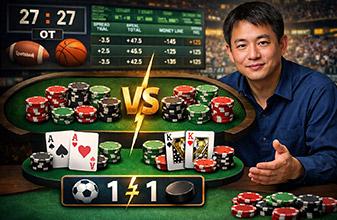Pit Boss of the Year

The Pilot: The Pit Boss of the Year award goes to...
I recently had an opportunity to play single deck for a couple of days. It was early in a blackjack trip and I knew that I would be visiting this same store several times during my stay. I was trying to not draw attention to myself by being overly aggressive.
The pit boss came over to my table and started a light chat with me. At the start of the next deck, a bunch of little cards came right off the top and the boss instantly noticed what I saw. He took a couple of steps back and stared at the deck and my betting circle, so I decided to flat bet because of his level of interest.
The count went very positive, and had I not chosen to flat bet, it would have been max bets as quickly as I could. As it turned out, I whiffed on every hand -- I lost them all! Final True Count was +22!
I built great credibility with this boss as being an ignorant ploppy, and was able to play his pit unmolested the rest of my stay. Timing is everything -- the boss wasn’t initially giving me any heat -- though perhaps some sweat -- but he was sure interested to see how I played with a huge count.
As a side benefit, I side-stepped losing a bunch of money, though of course I lost EV by flat betting. But as I left the store, I had to laugh to myself about how much money the boss cost the casino just by doing his job.
Comments by Lonesome Gambler: This is an issue that I think many players need to consider a little more in-depth. The Pilot explained his reasoning, and it's not my place to speculate whether or not his play was what I would consider to be justifiable -- that's a matter of personal preference. Backoffs can come quickly in single-deck games, which is a valid point. I would ask then, is the ability to play longer than 15 minutes valuable in a game where 15-minute backoffs are common? Will the casino tolerate a tiny player edge but not a bigger one? Does the boss know how to count? Will surveillance be fooled by the rounds that the pit boss didn't watch?
In other words, say you play a monster deck by flat betting the table minimum. How much money did you lose in EV? Surely you could make that EV up easily if you were allowed to play another few hours on that shift, but if they allow you to play a +EV game for that long, then what kind of cover is your flat-betting ploy buying you in the first place?
I think the whole concept of temporarily throwing away your edge in exchange for the possibility of being able to play longer is generally a misguided approach. With certain exceptions, I think that playing cover is a ridiculous waste of money -- pit personnel often can't count, and if surveillance runs a skills check, you're toast anyway. Betting cover will buy you time, but it can eliminate your edge. You'll look like a civilian because you'll have become one, by your own choice.
Furthermore, I think that there's a fundamental problem with the way players treat cover plays. It's easy to attribute longevity to their usage, just as it's easy to justify over-tipping by reasoning that it may have bought you better conditions. But the reality is that a vast majority of what you do in a casino goes over the heads of anyone who cares to watch. Many things that appear glaringly obvious to us are beyond even the finer points of what the game-protection staff is looking for.
I'm sure you remember the first time you pushed out a max bet, thinking, they're sure to get me now, and then the relief when nothing happened. We think that nothing goes unnoticed, but the opposite is often true.
The following was my philosophy early on, and I feel like it played a substantial role in my early success as a card counter: I wasn't afraid to use a bet spread of 1-60 in low-limit games, then get out before trouble came. I spread 1-20 for an hour in a double-deck game at a notoriously sweaty downtown Las Vegas property while having a chat with the boss about local dining. I never once used playing or betting cover; my cover was short sessions, a pleasant affect, and plain ol' paying attention to my surroundings.
I'm not necessarily advocating a no-holds-barred approach, although it’s legitimate and probably optimal for some folks, but I think that players should think twice before they throw money out of the window in exchange for nothing more than what I consider to be a fundamentally -EV gamble ($100 says the pit boss doesn't understand the significance of doubling A8 v 5 in the first place, and won't be able to make you based on that play alone).
There will be no one to prove you wrong if you do throw away your edge, and it will be easy to rationalize it based on the myriad praises of cover plays in the literature and within the advantage player community. But if you want to make money in this game, you need to look at everything you do with a strongly critical eye, and you must be able to recognize when you're wasting potential. Cover plays are not worthless, but they are situation-specific; more often than not, players at moderate stakes or less are in a situation where cover defeats the very purpose of playing.
Originally published on bj21.com Green Chip, edited for this format.











Please log in or register to leave a comment